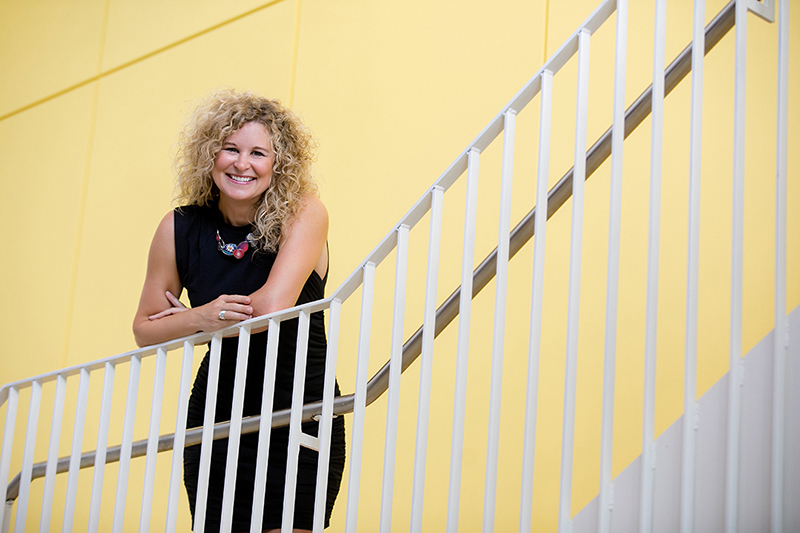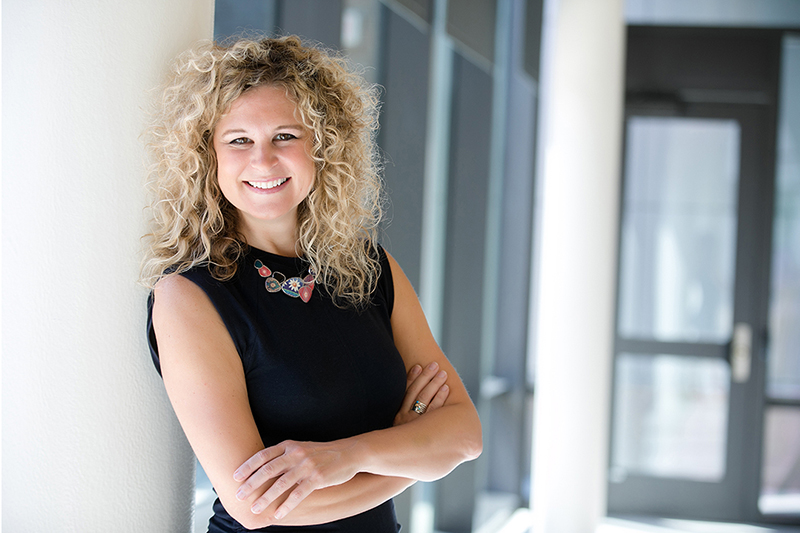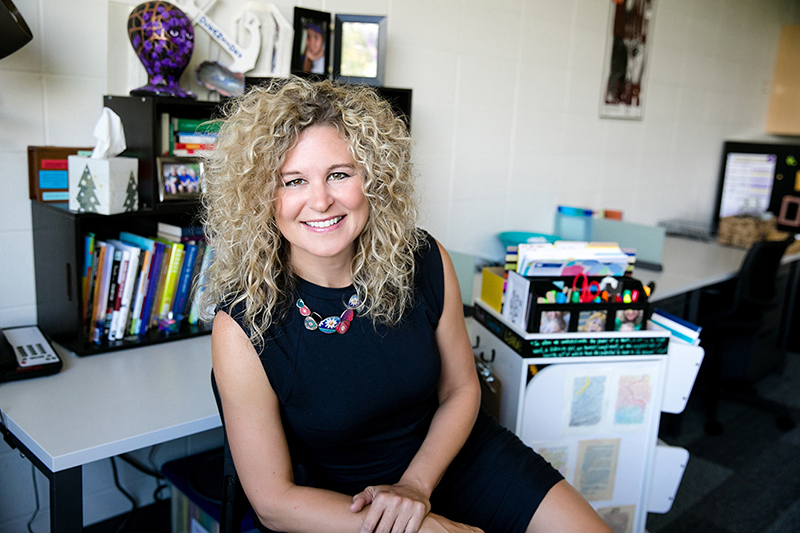One would think that Sarah Brown Wessling, the 2010 Iowa and National Teacher of the Year, would have always yearned to be an educator. After all, she regularly hosted “school” for the neighborhood kids in her parents’ garage while growing up in Winterset, Iowa, her mother taught fourth grade for nearly 30 years and her genealogy boasts a long line of teachers.
But Wessling (’98 English, MS ’03) had other ideas when she stepped foot on Iowa State’s campus in the fall of 1993 to embark on her college career.
“I wanted to be a TV anchor,” Wessling said. “The fact that Iowa State owned WOI television at the time was a huge draw for me.”
Eventually, however, Wessling realized that she didn’t like being in front of the camera, and she preferred creative writing over news copy. So, she gave psychology a try. Then philosophy. But they weren’t quite the right fit. Through it all, Wessling stuck with her first academic love—English. And then one day while walking across campus, it hit her.
“I think there must have been a bright light,” Wessling said, because the realization was so profound and instantaneous. Right there, somewhere in the middle of Iowa State’s gorgeous campus, Wessling knew she needed to be a teacher. By teaching, she could combine all her interests into one career.
“And the moment I realized that, I literally turned around, walked to Lagomarcino and went to what was then the College of Education, and said, ‘So I’m going to be a teacher. What do I do?’”
Full steam ahead
Once Wessling determined teaching was her career path, nothing held her back. She earned a bachelor’s degree in English education in 1998, and began teaching at Cedar Falls High School that fall. A year later, she took a high school English position at Johnston High School, where she still works.
Wessling continued her education by earning a master’s degree in English in 2003, also from Iowa State. She received the Graduate College Research Excellence Award for her thesis, which analyzed qualitatively and quantitatively the reading and writing experience of advanced placement students. In 2006, after enduring rigorous testing and evaluations, she earned National Teaching Board Certification, a feat accomplished by only 4% of teachers nationwide. She was recertified in 2015.
Wessling credits Iowa State and the support of several English department faculty for providing her with a foundation for success, both as an undergraduate and graduate student.
“I never felt alone, and by that I mean I always felt like there was someone who was interested in me, concerned about me, advocating for me, wanting the best for me,” she said.
Teacher of the Year accolades

By 2010, after just 12 years in the classroom, Wessling had already accumulated numerous teaching awards and honors. But the biggest honor came when a group of former students nominated her for Iowa’s Teacher of the Year Award, which she received. That put her in the running for National Teacher of the Year, which she was also awarded. Her reaction?
“Totally surreal. A lot of imposter syndrome,” Wessling said. “I felt like it was a tribute to the group of my former students who nominated me, and it was a tribute—not to me—but to the work we did together. And I hope it was a tribute to my teachers, to the people who changed me and inspired me.”
Following the announcement, Wessling’s life changed dramatically. The youngest of her three children was just 4 months old at the time, and he accompanied her to the White House to receive the award from President Obama. She was required to leave her Johnston High School classroom for an entire year and travel the country to promote the teaching profession and America’s education system.
“That year I did something like 250 speeches and workshops. I was in 39 states that year alone,” Wessling recalled.
One of the important lessons she quickly learned following the national award is that the honor didn’t change her relationships with her students.
“My students didn’t need a National Teacher of the Year,” she said. “What they needed was a human, someone who was willing to see them, be imperfect with them, willing to advocate for them.”
One of Wessling’s former students, 2016 Johnston High School graduate Noah Richards, praises Wessling’s teaching abilities. But it’s her involvement with students outside the classroom that really sticks with him.
“She is great one-on-one,” Richards said. “She was, and still is, always willing to talk to me and other students outside of school. She has personally helped me with many life decisions and shows a lot of empathy toward her current and former students.”
“My students didn’t need a National Teacher of the Year. What they needed was a human, someone who was willing to see them, be imperfect with them, willing to advocate for them.”
2019 Johnston High School graduate Sydney Clark describes Wessling as a teacher who understands that her job has less to do with the content she teaches, and more to do with the life skills she instills in her students.
“To Ms. Wessling, you are more than a face, a name or just another student. You’re a person with a story, someone of unique knowledge and value, someone who is worth knowing,” Clark said.
Learning by doing
Students—their well-being, what they learn and how they learn—are obviously Wessling’s top priority. At Johnston High School, she incorporates experiential learning – learning by doing – in her classroom because she knows firsthand these methods impact students throughout their lives.
Wessling was introduced to experiential learning by Mary Lou Myers, her fourth grade teacher back in Winterset. Wessling didn’t know the term at the time; she just knew that Miss Myers made learning fun. One day, Miss Myers asked her students what they wanted to learn. After brainstorming ideas, Wessling remembers that she and her classmates prepared a list and Miss Myers took those suggestions and designed a hands-on learning curriculum.
“She created units of study that were incredibly relevant to the students and to what was happening in the world at the time,” Wessling said. “I have really vivid memories of units about the Olympics and the presidential election.”
“Experiential learning has a really prominent place in my classroom because I think those experiences are what students ultimately remember."
Wessling said Miss Myers’ teaching philosophy has influenced her own. For example, when teaching a course about heroes, Wessling asked community members to visit her classroom. Students conducted interviews with the community members to uncover their “everyday hero” stories. The students recorded those interviews and turned them into podcasts.
In another class, Wessling developed an elaborate assignment that required students to create fictitious nonprofit organizations to help actual groups of individuals in central Iowa achieve their American dream. She asked professional grant writers, CEOs of nonprofits and others to sit on a faux board of directors, listen to the students’ grant proposals and determine which idea got “funded.”
“Experiential learning has a really prominent place in my classroom because I think those experiences are what students ultimately remember,” Wessling said. “It means bringing the community in and us going out into the community. It means having authentic audiences.”
Striking a balance

Almost a decade has passed since Wessling received national recognition for her teaching, but she continues to hold speaking engagements and workshops for teachers across the country. She also sits on the board of directors of the National Board for Professional Teaching Standards, a role she is passionate about.
“Sarah’s voice on the board is inspiring, reflective and bold,” said Peggy Brookins, president and CEO of the National Board for Professional Teaching Standards. “She is the consummate professional and ambassador of teaching. She is focused on the work, and I think she teaches every moment, no matter where she is or what she’s doing.”
In addition to out-of-classroom commitments, Wessling continues to teach at Johnston High School and is a single mom to her three kids – Evan, 15; Lauren, 13; and Zach, 9. It’s a lot to balance, and while Wessling sometimes still struggles with how to manage it all, she has developed some coping skills.
“I don’t do everything at once, and that’s important to know,” she said.
Wessling has a hybrid teaching role at Johnston. Primarily, she teaches classes during fall semester and schedules most of her speaking engagements and workshops during the rest of the year. Life remains hectic, but she has learned that one of the best ways to cope with it is by taking a walk, but not just around the block. Each year, Wessling takes a solo hiking trip to a new location, usually a national park, and just starts walking. She’ll walk anywhere from eight to 16 miles a day.
“When I start, my brain is really noisy and I just walk until I find myself again. That’s when I know I can be done,” she said.
“[Sarah] is the consummate professional and ambassador of teaching. She is focused on the work, and I think she teaches every moment, no matter where she is or what she’s doing.”
Her greatest success
Wessling has accomplished much in her relatively short teaching career. But when pressed about her greatest achievement, her response is quick and heartfelt.
“The very first thing that pops into my head are faces of students,” she said. “I see all the faces of young people that were able to see in themselves what I saw in them.”
And very often, the teacher becomes the student.
“There are moments when I see a student transformed because of the classroom, and I also have moments when I have been transformed because of the students,” she said. “My students teach me so much. They make me a better person, without a doubt.”
